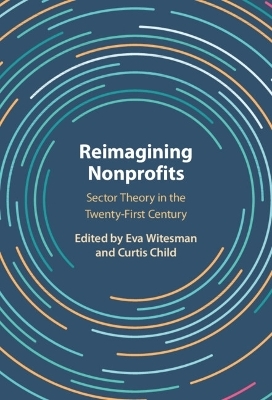
Reimagining Nonprofits
Cambridge University Press (Verlag)
978-1-009-26207-1 (ISBN)
What is the nonprofit sector and why does it exist? Collecting the writing of some of the most creative minds in the field of nonprofit studies, this book challenges our traditional understanding of the role and purpose of the nonprofit sector. It reflects on the ways in which new cultural and economic shifts bring existing assumptions into question and offers new conceptualizations of the nonprofit sector that will inform, provoke, and inspire. Nonprofit organization and activity is an enormously important part of social, cultural, and economic life around the world, but our conceptualization of their place in modern society is far from complete. Reimagining Nonprofits provides fresh insights that are necessary for understanding nonprofit organizations and sectors in the 21st century.
Eva Witesman is an Associate Professor at the Romney Institute of Public Service and Ethics and Academic Director of the Ballard Center for Social Impact at Brigham Young University. An institutional theorist who studies the nonprofit, public, and private sectors, she serves as incoming chair for the Public and Nonprofit division of the Academy of Management. Curtis Child is an Associate Professor and Chair of Sociology at Brigham Young University. He has published widely on nonprofit organizations and is a member of the Association for Research on Nonprofit Organizations and Voluntary Action.
1. An invitation to rethink the nonprofit sector Curtis Child and Eva Witesman; 2. An overview of nonprofit sector theories Curtis Child; 3. The prevalence of traditional nonprofit sector theories in research Megan LePere-Schloop and Rebecca Nesbit; 4. What makes good nonprofit sector theory? Eva Witesman; 5. Sector theorists should consider how social values determine unmet needs Ruth K. Hansen and Gregory R. Witkowski; 6. Sector theorists should embrace a social economy perspective Laurie Mook and John R. Whitman; 7. Sector theorists should expand three-failures theory to include the family sector and varied forms of government Richard Steinberg, Eleanor Brown and Liza L. Taylor; 8. Sector theorists should beware the nonprofit industrial complex Ana Clarissa Rojas Durazo; 9. Sector theorists should be inclusive of muslim and non-western perspectives Shariq Siddiqui; 10. Sector theorists should revisit the role of information George E. Mitchell and Jason Coupet; 11. Sector theorists should borrow epistemologies Elizabeth A. Castillo; 12. Nonprofits as organizational actors Patricia Bromley and Heitor Santos; 13. Nonprofits as enablers of multilayered representation Catherine E. Wilson; 14. Nonprofits as facilitators of national self-development Ada Ordor; 15. Nonprofits as part of an engineered social economy Meeyoung Lamothe, Jiwon Suh, Misun Lee, Hee Soun Jang, Bok Gyo Jeong and Seongho An; 16. Nonprofits as shaped by the ruling party Ming Hu and Yung-Pin Lu; 17. Nonprofits as sources of regime stability Yulia Skokova and Irina Krasnopolskaya; 18. Nonprofits as creators of transformative symbolic reality Robert W. Ressler; 19. Nonprofits as distributors of toll goods Eva Witesman; 20. Nonprofits as agents of moral authority Robbie Waters Robichau and Kandyce Fernandez; 21. Conclusions Eva Witesman and Curtis Child.
| Erscheinungsdatum | 23.01.2024 |
|---|---|
| Zusatzinfo | Worked examples or Exercises |
| Verlagsort | Cambridge |
| Sprache | englisch |
| Gewicht | 850 g |
| Themenwelt | Sozialwissenschaften ► Pädagogik ► Sozialpädagogik |
| Sozialwissenschaften ► Soziologie | |
| Wirtschaft ► Betriebswirtschaft / Management ► Planung / Organisation | |
| ISBN-10 | 1-009-26207-6 / 1009262076 |
| ISBN-13 | 978-1-009-26207-1 / 9781009262071 |
| Zustand | Neuware |
| Haben Sie eine Frage zum Produkt? |
aus dem Bereich


